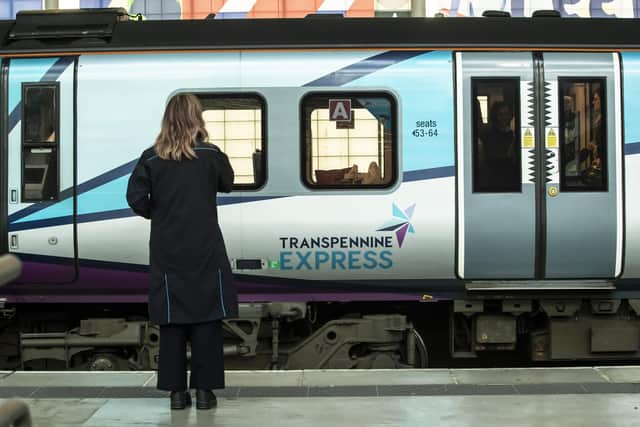Improving east-west rail connections would be liberating for people in the North - Jayne Dowle
It’s a work event in Manchester this Wednesday evening and the 30-mile trip from my home in South Yorkshire involves more consideration and double-checking than flying to Spain.
Indeed, I know people who are shunning the railways altogether and opting to fly around the UK instead. A friend with a student daughter in Manchester says she is booking a return plane ticket to Newquay for an end of year holiday because it’s around a third of the cost of a train ticket, even with a student railcard.
Advertisement
Hide AdAdvertisement
Hide AdEvery time I cross the Pennines I have the same circular debate with myself; drive or take the train? Both options have their drawbacks, but opting for the train always carries the biggest risk. What should be a simple journey can turn into an ordeal.


I’ll hardly be partying at the event, so I could drive, but if the traffic’s bad at Mottram Moor on the outward journey, I’ll end up late and panicky. Also, I have to find somewhere safe to park in an unfamiliar part of Manchester city centre, then drive back again. In the dark. On my own. I’m an experienced driver and I’ve done the route many times, which is why the Woodhead Pass in torrential rain at 11pm terrifies me, frankly.
Letting the train take the strain instead should be a simple matter. It’s not; travelling to Manchester from Barnsley by Transpennine Express (TPE) is always a fretful gamble, taking at least two hours door to door.
It involves obsessive checking for possible strike action or cancellations the night before, fretting about the last train/s of the evening disappearing off the schedule, missing my connection in Sheffield or Huddersfield because obviously, there are no direct trains from Barnsley, even though I can see planes heading for Manchester airport switch on their landing lights from my bedroom window.
Advertisement
Hide AdAdvertisement
Hide AdIt shouldn’t have to be like this. Yet cancellations and poor service, staff shortages and inadequate carriages - you’re lucky if you get a lavatory, never mind a charging socket – mean that TPE is not so much rolling stock as laughing stock. Only it’s not funny. People are involved, their livelihoods and their jobs, which rely on getting to work on time and home again too.
The Government is right to take action; the operator is in a mess.
In January this year, industry regulator the Office of Rail and Road, ordered TPE and other train company offenders to stop misusing ‘p-codes’ (excuses for cancelled trains) and supply truthful statistics that exposed exactly what passengers were suffering.
Immediately things became clearer to those wondering why their journeys were blighted, but TPE still insisted otherwise. During the period between February 5 and March 4, TPE’s cancellation score worsened from 7.2 per cent to 23.8 per cent when adjusted to include p-coding due to a shortage of available crew.
Advertisement
Hide AdAdvertisement
Hide AdI should be grateful, I tell myself. I only have to make this arduous journey once every month or so. Some poor souls have to commute from Leeds or Sheffield to Manchester every day.
I’ve heard of people quitting well-paid and rewarding jobs because they simply can’t rely on the trains, ducking out of college courses because the hassle is simply too much, or throwing in the towel altogether and driving instead if they can’t haggle their boss to work from home.
Driving, of course, does not offer a magic solution. More cars on the road simply means more congestion, and makes a complete mockery of the Government’s stated aims towards a zero carbon future.
It’s all about connections. I’m always surprised by the knowledge gulf between Leeds and Manchester, two such major cities in the North of England.
Advertisement
Hide AdAdvertisement
Hide AdWhilst there is healthy competition between the two to steal the Northern crown for business excellence, retail opportunities, hospitality and entertainment, there is a woeful lack of mutual understanding between Greater Manchester and Yorkshire, despite our sharing of a border.
I did a talk recently to a group of business people in Manchester, and they admitted that the Yorkshire coast and our historic places are mostly a mystery to them. It’s not a matter of miles – it’s only 36 miles to Leeds from Manchester, for example – but of experience. How liberating it would be if it was easier to travel across the country instead of up and down it, and how important for economic growth.